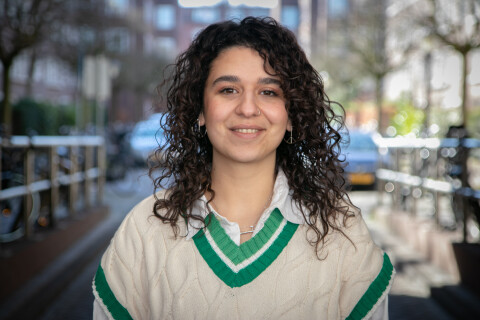
April 22nd 2022
Colleague in de spotlight: Pegy Ibrahim
The energy and drive radiate when I speak to Pegy. What an inspiring girl I have sitting in front of me! Pegy studies International Business at the Amsterdam University of Applied Sciences and is currently doing her graduation assignment at Refugee Talent Hub. “I want to create more understanding.”
Please note: this article was translated using a translator appHow it started
As a sixteen-year-old, Pegy fled alone from Syria to the Netherlands in 2015. A brave, strong girl, looking for a better life for her and her family. From the AZC she was soon able to contact foster mother Babette, who helped her enormously: she had a home, someone who encouraged her and who helped her with all the rules and 'things'. Someone with whom she could be herself and grow. She now lives on her own and her mother and brother are also in the Netherlands.
Graduation assignment
Pegy knows from an early age that she wants to make a difference for other refugees. “I wish everyone the opportunities I have been given to grow and settle here.” She sees a vacancy at Refugee Talent Hub for an internship, takes the plunge and pitches her idea for a graduation assignment to Wilma (director of Refugee Talent Hub, ed.). “I was already proud that I had the opportunity to discuss this. And now I am working here, investigating how we can even better safeguard the retention of refugees in the Dutch labor market. What makes this extra valuable to me is that I now get to know all kinds of people who have given people like me – a refugee – a push.”
Within her graduation assignment, it is essential for Pegy to include cross-cultural aspects. “Culture is crucial in retaining people, I know that from my own experience. It was mainly the little things that surprised me when I came here. You don't know 'the codes', so I delved into them from the start. How does this work, why do people say this or that? How do people explain a term in their heads?”
Hospitable
“To give you an example: people are hospitable in both Syria and the Netherlands. But hospitality in the Netherlands has a different meaning than in Syria. That is why it is always important to keep asking what exactly someone means, and how someone explains it in their head. The best thing about hospitality in Syria is that it is all-encompassing: the house is always open to everyone, you are open to everyone: your colleagues, your neighbors, everyone around you. For me, being hospitable means empathy, listening, experiencing. And I take that hospitality with me in everything I do.”
And is there anything you found difficult in the Netherlands, about Dutch culture? “I've struggled with saying 'no'. In Arabic it isn't really there: you never say 'no', but wrap it up. For example, 'I'll try it for you...' even if you already know it won't work. Especially when you are called upon to help, I find it difficult to say no. Fortunately, I had an experience with this quite early on when I worked in the catering industry and started helping out a bit, while I was actually going to a party myself. Babette then showed me how you can indicate your boundaries in the Netherlands. I was very happy she was there!”
Human story
“So much is said about people who have fled, but I also want to tell my story. What it's like for us. It's a human story. I can't imagine reading a story like that and not being touched by it. People who flee go through so much. Not just the journey and what you lose. It is an experience that will stay with you forever. Suddenly everything as you knew it is gone and you are left with only one choice: die or leave. Close your eyes and imagine it. Where should you go, what should or can you take with you, how is your family doing... It immediately makes me emotional again. Fleeing is really bad.”
World person
“I have become a world person, I take the best from different cultures. These different influences make me who I am. And I feel connected to everyone who has fled, wherever they come from. That is my motivation to create more understanding.”